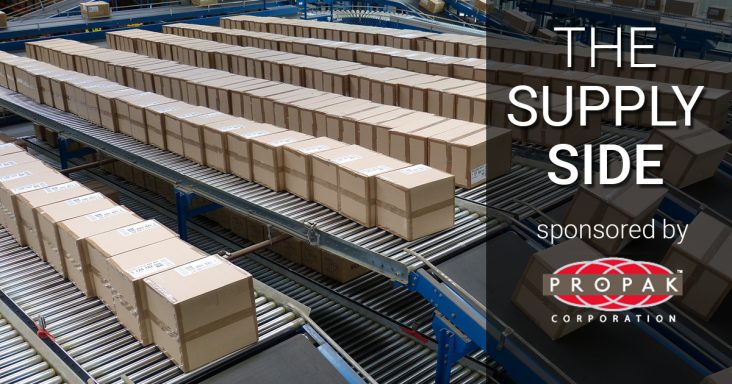The Supply Side: Retailers continue to push private brand sales
by March 12, 2023 10:08 am 1,870 views

Major retailers have long used private labels to create unique brands, with the average industry share penetration for such brands at 18.2% at the end of 2022, according to Food Industry Association (FMI) research. Retailers intend to grow the share to 22.6%.
“A factor driving this ambitious growth expectation is potentially higher consumer demand resulting from the challenging U.S. economy, in light of inflation and prospect of recession,” noted David Orgel, who authored the FMI report.
FMI found that 93% of the retailers surveyed said private brands are very or extremely important to their business, and 83% plan to boost investments in private brands in the next year. The survey also revealed that 69% of respondents saw the most upside opportunities in premium private brands. Also, 60% said they foresee the highest share growth in simple/clean ingredients deemed “better for you” and catering to “gluten-free” diet demand. Over half of the respondents saw opportunities for growth in the best-value foods, given that consumers are chasing lower prices.
Costco is a leader in private brand loyalty. Its Kirkland Signature products include non-food consumables, grocery, general merchandise, bakery, and adult beverages. Named for its hometown Kirkland, Wash., Costco has achieved a cult following with the multibillion-dollar brand that typically sells for up to 20% less than national brand counterparts.
“Kirkland is a brand in its own right. It’s one of the reasons people go to Costco. That’s not something you can say about many private labels,” noted Karen Short, a retail analyst at Barclays.
Costco reported it grew the Kirkland Signature market share by 1% between fiscal 2021 and fiscal 2022 year-end ended Aug. 28. The company said Kirkland Signature market penetration was 28% last year.
CEOs of Walmart and Kroger each recently said consumers were choosing private brands over some national brands because of the value they provide at a time when households are watching spending amid sustained inflation.
“When the economy is tight, our brands always gain share,” said Kroger CEO Rodney McMullen.
He said Kroger would continue investing in private brands to fill the gaps where national brands need to catch up. McMullen said many national brands — Kraft Heinz, Mondalez, PepsiCo, CocaCola, Unilever and Hershey — have said they plan to raise prices again this year, and that’s more opportunity for private brands to grow share among value-oriented shoppers.
Discounter Walmart has often been seen as a winner in inflationary times because of its scale and ability to hold down prices longer than smaller competitors. Walmart also has a vast assortment of private brands, each with more than $1 billion in annual sales such as Great Value, Marketside and Equate in the consumables category.
In late 2022, Numerator reported that Walmart owned four of the top five private brands in the consumables sector. Its Great Value brand was reportedly purchased by 72% of the U.S. population last year. Numerator reported Target’s private-label market share for grocery, household, health and beauty is 15.1%, Whole Foods Market is 14.7%, and Publix is 13.6%. Walmart’s market share in those categories is 60%.
Walmart U.S. CEO John Furner said in the January earnings call that there is some switching from national brands to private labels, particularly in categories like deli, lunch meat, bacon and dairy, allowing the retailer to grow its share.
Sam’s Club also claims its focus on Member Mark’s private brand has been a game-changer in recent years. Member’s Mark represents 30% of total sales at Sam’s Club, equal to $22.08 billion. Sam’s Club has also worked to make its Member’s Mark brand more attractive to consumers, according to Sam’s Club CEO Kath McLay. During the retailer’s shareholder events in June, she told the media that Member’s Mark aspires to be brand customers “must have” because they trust the quality and value.
Since 2017, Sam’s has grown the value of its Member’s Mark by more than 100%, and it remains the top preferred brand on SamsClub.com. Company leadership said the successful growth of Member’s Mark is also about creating a solid asset and loyalty base for the retailer’s overall business.
Procter & Gamble recently said it plans to fight back with more advertising about the quality of its brands over private-label products. Walmart CEO Doug McMillon said that the retailer was prepared to allocate more space for private and tertiary brands for families needing lower prices. He said suppliers unwilling to help with lower prices could see less shelf space.
Carol Spieckerman, president of Spieckerman Retail, said the relationship between national and private brands doesn’t have to be adversarial, particularly given that private brand development is a side business for some national brands.
“Since most major retailers employ a mix of national and private brands, national brands benefit by positioning as complements to private brands rather than as competitors. It isn’t a zero-sum game,” she said. “Retailers will continue to invest in private brands because the margin benefits, differentiation, control, and consumer value proposition represent an irresistible, evergreen combination.”
She said investment doesn’t necessarily translate to expansion since it can take years for a private brand program to gain traction. She noted ongoing upgrades to existing brands might make sense in many cases, and occasional portfolio pruning also makes sense.
Editor’s note: The Supply Side section of Talk Business & Politics focuses on the companies, organizations, issues and individuals engaged in providing products and services to retailers. The Supply Side is managed by Talk Business & Politics and sponsored by Propak Logistics.
